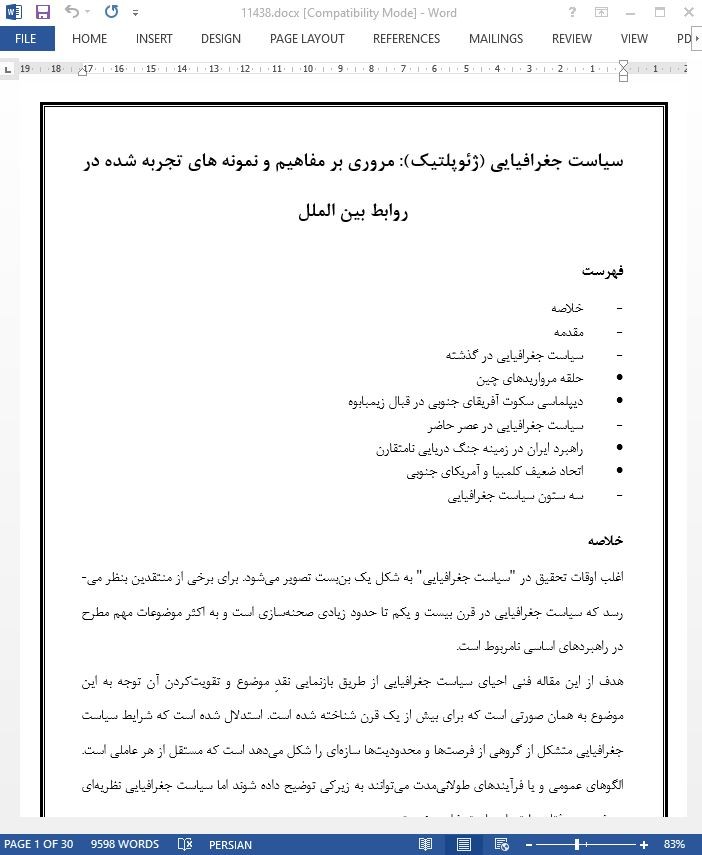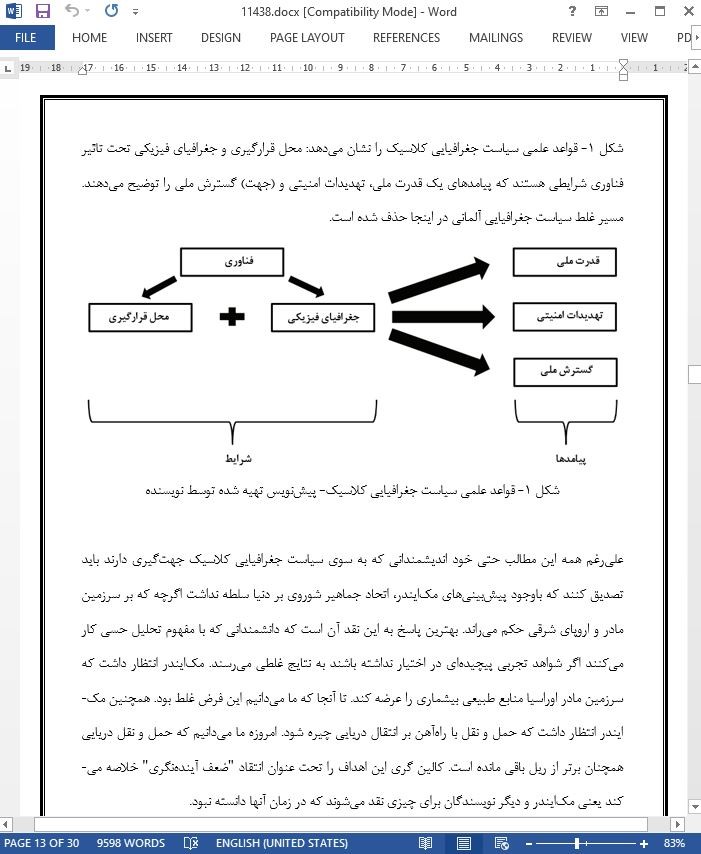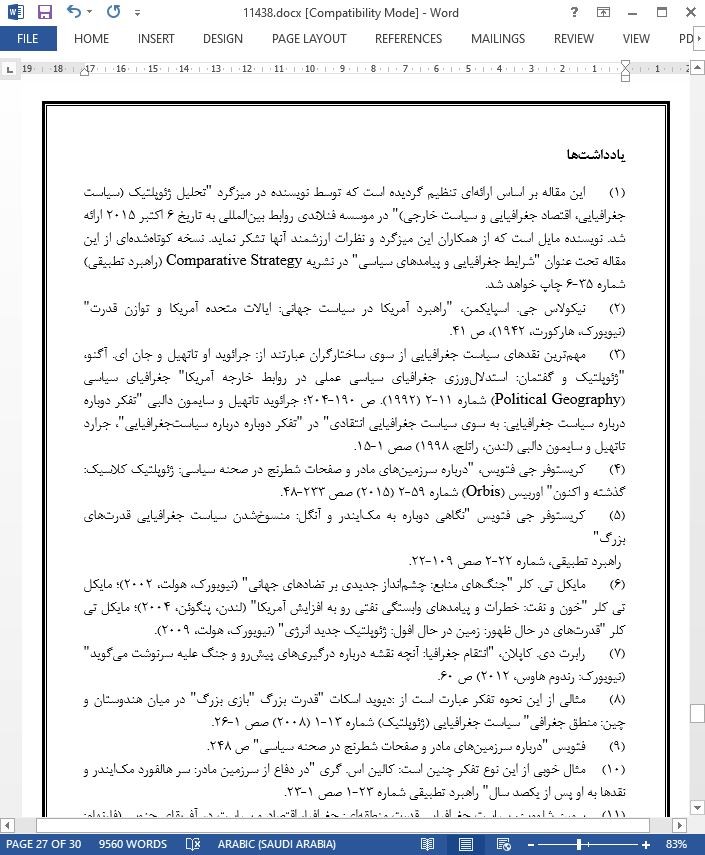
سیاست جغرافیایی (ژئوپلتیک): مروری بر مفاهیم و نمونه های تجربه شده در روابط بین الملل
خلاصه
اغلب اوقات تحقیق در "سیاست جغرافیایی" به شکل یک بن بست تصویر می شود. برای برخی از منتقدین بنظر می رسد که سیاست جغرافیایی در قرن بیست و یکم تا حدود زیادی صحنه سازی است و به اکثر موضوعات مهم مطرح در راهبردهای اساسی نامربوط است.
هدف از این مقاله فنی احیای سیاست جغرافیایی از طریق بازنمایی نقدِ موضوع و تقویت کردن آن توجه به این موضوع به همان صورتی است که برای بیش از یک قرن شناخته شده است. استدلال شده است که شرایط سیاست جغرافیایی متشکل از گروهی از فرصت ها و محدودیت ها سازه ای را شکل می دهد است که مستقل از هر عاملی است. الگوهای عمومی و یا فرآیندهای طولانی مدت می توانند به زیرکی توضیح داده شوند اما سیاست جغرافیایی نظریه ای در خصوص رفتار دولت یا سیاست خارجه نیست.
بنابراین درک کردن پدیده ویژه ای که در روابط بین الملل اتفاق می افتد نیازمند توجه به عوامل غیرجغرافیایی است. ترکیبی از عوامل جغرافیایی و غیرجغرافیایی توضیحات معقولی را فراهم می آورند چنانکه برخی از نمونه ها نیز نشان میدهند: مانور قدرتِ چین در اقیانوس هند، رویکرد آفریقای جنوبی در قبال بحران سیاسی در زیمبابوه در سال 2008، راهبرد دریایی ایران و اتحاد ضعیف کلمبیا و آمریکای جنوبی.
مقدمه (1)
نیکولاس اسپایکمن زمانی نوشت که "وزرا می آیند و می روند حتی دیکتاتورها می میرند اما رشته کوه ها بدون تغییر باقی می مانند". (2) اسپایکمن به دلیل ثبات شرایط جغرافیایی- واقعیت فیزیکی است که چهره را شکل می دهد- این شرایط را در روابط بین الملل سرنوشت ساز می داند. در این اواخر این نحوه تفکر در سیاست جغرافیایی توسط ساختارگرایانی نظیر جان آگنو، سایمون دالبی و جرائوید او تاتهیل (3) و برای دهه ها توسط واقع گرایان به شدت مورد انتقاد قرار گرفته است. اخیراً در مقاله ای که در مجله اوربیس منتشر شده، کریستوفر فتویس استدلال می-کند که سیاست جغرافیایی از نقایص توصیفی، پیشنهادی و پیش بینی کننده ای رنج می برد. بر اساس نظر فتویس بر اساس دلایل ذکرشده، سیاست جغرافیایی نمی تواند کار فکری معناداری را سامان دهد (4). چنانکه او در مقاله-ای پیشتر در مجله "راهبرد تطبیقی" اشاره می کند، سیاست جغرافیایی منسوخ شده است (5).
SUMMARY
Geopolitical research is frequently portrayed as a dead end. To some scholars it appears that in the 21st century geography is largely scenery, all but irrelevant to the most important issues of grand strategy.
This working paper aims to revitalise geopolitics, reflecting both on the critique of the subject and the strengths that have characterised it for more than a century. It is argued that geographical conditions constitute a set of opportunities and constraints, a structure that is independent of agency. General patterns and long-term processes can be aptly explained by this structure but geopolitics is not a theory of state behaviour or foreign policy.
Understanding specific phenomena that occur in international relations therefore requires taking into consideration non-geographical factors. Such a combination of geographical and non-geographical factors provides sound explanations, as several examples demonstrate: China’s projection of power into the Indian Ocean, South Africa’s approach to the political crisis in Zimbabwe in 2008, Iran’s maritime strategy and the poor integration of Colombia and South America.
INTRODUCTION1
Nicholas Spykman once wrote that ‘ministers come and go, even dictators die, but mountain ranges stand unperturbed’.2 Due to their persistence, Spykman regarded geographical conditions – the physical reality that states face – as being decisive for international relations. This type of geopolitical thinking has been strongly criticised, more recently by constructivists such as John Agnew, Simon Dalby and Gearóid Ó Tuathail,3 and for decades by realists. In an article recently published in the journal Orbis, Christopher Fettweis argues that geopolitics suffers from major descriptive, prescriptive and predictive deficiencies. According to Fettweis, geopolitics is therefore unable to produce meaningful scholarly work.4 It has become obsolete, as he claims in an article published earlier in Comparative Strategy.5
خلاصه
مقدمه
سیاست جغرافیایی در گذشته
• حلقه مرواریدهای چین
• دیپلماسی سکوت آفریقای جنوبی در قبال زیمبابوه
سیاست جغرافیایی در عصر حاضر
• راهبرد ایران در زمینه جنگ دریایی نامتقارن
• اتحاد ضعیف کلمبیا و آمریکای جنوبی
سه ستون سیاست جغرافیایی
SUMMARY
INTRODUCTION
GEOPOLITICS IN THE PAST
• China’s string of pearls
• South Africa’s quiet diplomacy vis-à-vis Zimbabwe
GEOPOLITICS IN THE PRESENT
• Iran’s strategy of asymmetric maritime warfare
• The poor integration of Colombia and South America
THREE PILLARS OF GEOPOLITICS
- اصل مقاله انگلیسی با فرمت ورد (word) با قابلیت ویرایش
- ترجمه فارسی مقاله با فرمت ورد (word) با قابلیت ویرایش، بدون آرم سایت ای ترجمه
- ترجمه فارسی مقاله با فرمت pdf، بدون آرم سایت ای ترجمه



